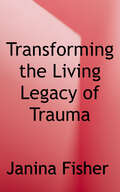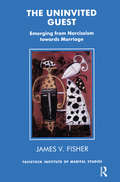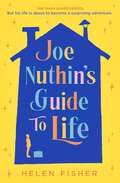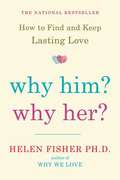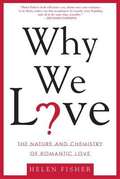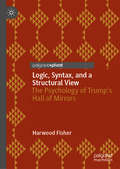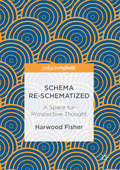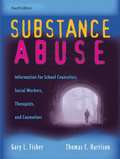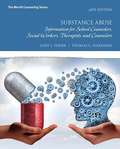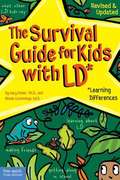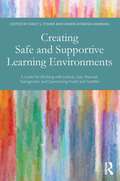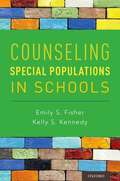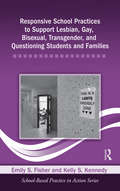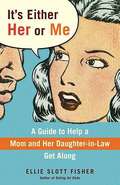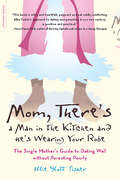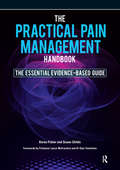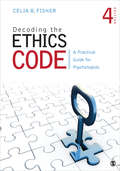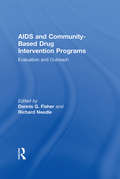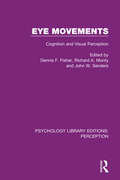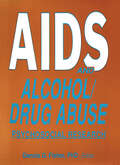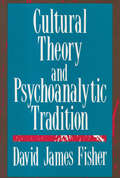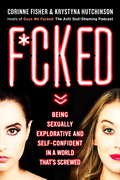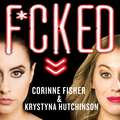- Table View
- List View
Transforming the Living Legacy of Trauma: A Workbook for Survivors and Therapists
by Janina FisherTraumatic experiences leave a “living legacy” of effects that often persist for years and decades after the events are over. Historically, it has always been assumed that re-telling the story of what happened would resolve these effects. However, survivors report a different experience: Telling and re-telling the story of what happened to them often reactivates their trauma responses, overwhelming them rather than resolving the trauma. To transform traumatic experiences, survivors need to understand their symptoms and reactions as normal responses to abnormal events. They need ways to work with the symptoms that intrude on their daily activities, preventing a life beyond trauma.
The Uninvited Guest: Emerging from Narcissism towards Marriage
by James V. FisherThis book brings together a deep thoughtfulness about the insights of psychoanalysis and its application to work with troubled couples with an original and closely argued reading of some classic plays about marriage. It will be of use to readers interested in psychoanalysis and literature.
Joe Nuthin's Guide to Life: 'A real joy to read' –Hazel Prior
by Helen Fisher&‘Extraordinary&’ Heidi Swain&‘Life-affirming&’ Hazel Prior&‘Big-hearted&’ Caroline Day&‘Beautiful&’ Julietta Henderson Joe loves predictability. But his life is about to become a surprising adventure. Joe-Nathan likes the two parts of his name separate, just like his dinner and dessert. Mean Charlie at work sometimes calls him Joe-Nuthin. But Joe is far from nothing. Joe is a good friend, he&’s good at his job, good at making things and good at following the rules, and he&’s learning how to do lots of things by himself. Joe&’s mother knows there are a million things in life he isn&’t prepared for. While she helps guide him every day, she&’s also writing notebooks full of advice about the things she hasn&’t told Joe yet, things he might forget and answers to questions he hasn&’t yet asked. Following her wisdom – applying it in his own unique way – this next part of Joe&’s life is more of a surprise than he expects. Because he&’s about to learn that remarkable things can happen when you leave your comfort zone, and that you can do even the hardest things with a little help from your friends. Praise for Helen Fisher &‘I really enjoyed Space Hopper. It&’s such an unusual, intriguing novel&’ Marian Keyes &‘A magical story of love, loss and the ways that grief changes us forever&’ Margo Rabb &‘A lovely, deeply moving story of loss and love and memory made real&’ Diana Gabaldon &‘This story will bounce joyfully through your heart, leaving you with a fresh belief in second chances&’ Anstey Harris &‘Tender, mesmerising and original&’ Lucy Clarke &‘Charming and powerful&’ Marjan Kamali &‘Beautiful&’ Stylist &‘An unputdownable debut from a writer to watch&’ Bustle &‘A quirky story, full of love and laughter&’ Best &‘Will draw you in and keep you hooked until the last page&’ Heat &‘Magical&’ Platinum &‘Amazing&’ Daily Mail
Why Him? Why Her?: How to Find and Keep Lasting Love
by Helen FisherThe national bestseller that shows you how a better understanding of who you are will help you find and keep the love you want Helen Fisher can often tell, almost instantly, the hidden strengths and weaknesses in a relationship that are likely to keep a couple together or pull them apart. The words they choose, their facial structure and body language, even their doodles and where they live give strong clues to their personality type. After three decades of studying romantic relationships, Fisher has discovered that your dominant personality type guides not only who you are but who you love. Why Him? Why Her? provides a new way to understand relationships, whether you're searching for one or eager to strengthen the one you have. Beginning with a scientifically developed questionnaire to determine your prevailing personality type, Fisher tells you not only what type of person you might have chemistry with but how to find them, attract them, and keep them. Once you know the personality profile of the partner you're with--or hope to find--you can use your knowledge of how your types match up to improve your love life. More than seven million people in forty countries have learned Fisher's techniques and are using these tools to make and keep lasting romantic connections. Based on proven results, this groundbreaking book goes beyond theory to show that the complex nature of romance isn't so complicated once you truly understand yourself and others. Provocative and illuminating, Fisher's book deserves to be read by everyone looking to be loved for who they really are.
Why We Love: The Nature And Chemistry Of Romantic Love
by Helen FisherIn Why We Love, renowned anthropologist Helen Fisher offers a new map of the phenomenon of love—from its origins in the brain to the thrilling havoc it creates in our bodies and behavior. Working with a team of scientists to scan the brains of people who had just fallen madly in love, Fisher proved what psychologists had until recently only suspected: when you fall in love, specific areas of the brain "light up" with increased blood flow. This sweeping new book uses this data to argue that romantic passion is hardwired into our brains by millions of years of evolution. It is not an emotion; it is a drive as powerful as hunger. Provocative, enlightening, engaging, and persuasive, Why We Love offers radical new answers to age-old questions: what love is, who we love—and how to keep love alive.
Logic, Syntax, and a Structural View: The Psychology of Trump's Hall of Mirrors
by Harwood FisherThis book presents a new structural approach to the psychology of the person, inspired by Kenneth Colby’s computer-generated simulation, PARRY. The simulation was of a paranoid psychological state, represented in forms of the person's logic and syntax, as these would be evidenced in personal communication. Harwood Fisher uses a Structural View to highlight similarities in the logical form of the linguistic representations of Donald Trump, his avid followers (“Trumpers”), and the paranoid—referred to as “The Trio.” He demonstrates how the Structural View forms a series of logical and schematic patterns, similar to the way that content analysis can bring forth associations meanings, and concepts held in the text. Such comparisons, Fisher argues, can be used to shed light on contingencies for presenting, representing, and judging truth. Specifically, Fisher posits that the major syntactic and logical patterns that were used to produce the computer-generated “paranoid” responses in Colby’s project can be used to analyze Donald Trump’s rhetoric and his followers’ reactions to it. Ultimately, Fisher offers a new kind of structural approach for the philosophy of psychology. This novel work will appeal to students and scholars of social and cognitive psychology, psychology of personality, psychiatric classification, psycholinguistics, rhetoric, and computer science.
Schema Re-schematized
by Harwood FisherThis volume expands the concept and role of the schema, with three goals in mind: 1) to outline the continuing issues in the schema concept as the legacy of Kant's concept and analysis, 2) to show that Kant's challenges resulted in successful but truncated views of the schema and its functions, 3) to reconstruct Otto Selz's schema concept by proposing an alternative. The basis and scope of Selz's schema were intended to yield a more complete follow-up to Kant's challenges These had emerged out of his unresolved view of the schema as knowledge, on one hand, and thought, on the other. Selz' concepts--'anticipatory schema,' 'coordinate relations,' and 'knowledge complex'--are more inclusive and psychologically dynamic than those of his influential but reductionist detractors: Piaget, Bartlett, and Craik. Harwood Fisher explores Selz' ideas in past, present, and future temporal contexts. His predecessors' and his contemporaries' ideas influenced him. Present-day needs and future prospects round out a Selzian conception of the schema that would enrich a psychology of thought and knowledge.
Substance Abuse: Information for School Counselors, Social Workers, Therapists, and Counselors (4th edition)
by Gary L. Fisher Thomas C. HarrisonWeaving actual clinical examples with solid research, Substance Abuse continues to provide counseling, social work, and other students with a detailed overview of the alcohol and other drug (AOD) field. Now in its Third Edition, this text provides updated coverage and practical clinical examples to reflect the rapid changes in the field of addiction. In a reader-friendly style, the authors present balanced coverage of various treatment models as well as objective discussions of the controversies in the field. The text covers topics spanning the entire field--pharmacology, assessment and diagnosis, treatment, recovery, prevention, children, families, and other addictions--providing students with a broad view of the AOD field as well as the pervasiveness of the problem in all areas of behavioral health and general fields.
Substance Abuse: Information for School Counselors, Social Workers, Therapists, and Counselors (Sixth Edition)
by Gary L. Fisher Thomas C. Harrison<p>In an accessible writing style, Fisher and Harrison’s Substance Abuse: Information for School Counselors, Social Workers, Therapists and Counselors presents succinct, practical coverage of alcohol and other drug prevention, treatment, and recovery for generalist students, prospective mental health professionals, and allied professionals. It includes basic information on substances of abuse and focuses on clinically relevant knowledge on such topics as cultural competence, co-occurring disorders, other behavioral addictions, children and families, and ethics and confidentiality. <p>Each chapter includes clinical application cases and questions for further discussion. The new edition inclues a new chapter on “Co-Occurring Disorders and Other Special Populations,” new information on cultural competencies and intervening with special populations such as the elderly and LGBTQQI, and new information on risk factors for alcohol and other drugs for culturally and ethnically diverse populations. </p>
The Survival Guide for Kids with LD*: *Learning Differences
by Gary L. Fisher Rhoda CummingsThis book discusses how children with learning differences can get along better in school, set goals, and plan for the future. With references and index.
Creating Safe and Supportive Learning Environments: A Guide for Working With Lesbian, Gay, Bisexual, Transgender, and Questioning Youth and Families
by Emily S. Fisher Karen Komosa-HawkinsThe importance of creating safe spaces for lesbian, gay, bisexual, transgender, and questioning (LGBTQ) students in the school environment cannot be overstated. It is one of the most prominent issues facing school professionals today, and its success has lasting, positive effects on the entire student body. Drawing on the expertise of researchers and practitioners, Creating Safe and Supportive Learning Environments provides a comprehensive examination of the topics most relevant for school professionals. The first section lays out the theoretical foundation and background school professionals need to understand the social and political trends that impact LGBTQ individuals, the development of sexual orientation and gender identity, risk and resilience factors, and the intersection of LGBTQ identity with other aspects of diversity. The second section explores topics critical for the development of safe, supportive school environments, including understanding legal and ethical mandates, training school personnel, addressing bullying and harassment, and developing inclusive classrooms. Special topics related to counseling LGBTQ students, supporting families of LGBTQ students, becoming an ally and advocate in the schools, and connecting with community resources are also covered. CE credit is available to purchasers of this book at www.mensanapublications.com.
Counseling Special Populations in Schools
by Emily S. Fisher Kelly S. KennedyCounseling Special Populations in Schools provides school-based mental health professionals with practical, specific strategies for counseling special populations of students who are at risk for academic, social, emotional, and behavioral problems in school. These special populations include students who are homeless, living in foster care, involved with the juvenile justice system, LGBTQ, pregnant or parenting, gifted, in military families, at-risk for school failure and dropout, and impacted by incarcerated parents. Each chapter focuses on one group of students, highlighting critical background information and providing evidence-informed counseling approaches and strategies to promote resilience and support student development. Chapters provide specific information about how to use basic counseling skills, as well as more advanced counseling techniques such as Solution-Focused Brief Therapy, Cognitive Behavioral Therapy, and Motivational Interviewing, to address the needs and challenges of these special populations of students. This advanced-level counseling book is an excellent resource for mental health professionals and graduate students who want to be able to provide effective counseling services for all students.
Responsive School Practices to Support Lesbian, Gay, Bisexual, Transgender, and Questioning Students and Families (School-Based Practice in Action)
by Emily S. Fisher Kelly S. KennedyThe needs and rights of lesbian, gay, bisexual, transgender, and questioning (LGBTQ) students and families are often ignored, generally misunderstood, and only rarely given priority by the school system. This book provides a practical and useful guide for school-based mental health professionals to support students, families, teachers, and administrators in the development of a safe, inclusive school environment for all LGBTQ students and families. It begins with an overview of the unique issues and challenges faced by LGBTQ students and families, including a discussion of sexuality and gender identity development within the interconnected contexts of home, school, and community. Practical steps are given for creating an inclusive school environment; implementing prevention and intervention techniques to address discrimination, bullying, and violence; and organizing effective counseling programs for LGBTQ students. These school-based efforts are then extended to working with families and communities to reinforce steps taken in the school context. An accompanying CD includes numerous handouts, sample letters, and other resources to assist the school-based mental health professional in implementing responsive and affirmative practices for LGBTQ students and families.
It’s Either Her or Me: A Guide to Help a Mom and Her Daughter-in-Law Get Along
by Ellie Slott FisherFrom the author of "Dating for Dads" and "Mom, There's a Man in the Kitchen and He's Wearing Your Robe" comes a new advice book covering the stickiest of relationships--that between a mother and her son's significant other.
Mom, There's a Man in the Kitchen and He's Wearing Your Robe: The Single Mom's Guide to Dating Well Without Parenting Poorly
by Ellie Slott FisherEmbarking on the dating scene can be a fun though sometimes daunting prospect for any single woman. But for the more than 10 million single women in the U. S. with children at home, dating is a much more complicated matter. Whether uncoupled through divorce or death, single moms face a wide range of questions: When will I be ready to date and how do I start? When-and what-should I tell the kids? What happens if I love the guy and the kids hate him?In Mom, There's a Man in the Kitchen and He's Wearing Your Robe, Ellie Slott Fisher, a once-widowed, once-divorced single mother of two, speaks with refreshing candor about balancing dating and parenting. Drawing upon her own experience, the stories of many other women, and the advice of family psychologists, Fisher offers encouragement, strategies, and a healthy dose of humor for the single-but-looking mom-from how to meet men in the first place to when to introduce your date to the kids, from when and where to work sex into the equation to how to talk to your dating teenagers without looking like a hypocrite. Practical, funny, and hopeful, this is the one guide single moms need before jumping into the murky waters of the dating pool.
The Practical Pain Management Handbook: The Essential Evidence-Based Guide
by Dr Keren FisherThe successful management of chronic pain remains an elusive goal. As more complex diagnostic and intervention procedures become available, patients and clinicians alike have ever-greater expectations of banishing the problem of pain altogether. Unfortunately this hope is rarely fulfilled and the frustration experienced by everyone affected by chronic pain has remained more or less the same over the last two or three decades. Based on over 40 years' of experience and research The Practical Pain Management Handbook is a unique resource specifically designed for therapists involved in running Pain Management Programmes (PMPs). This engaging and effective handbook includes: intensive inpatient and extended outpatient programmes all of which are at least 25 hours in length; interactive materials designed to be used to form the basis of group discussion. Where there is a question in the text the suggested answer material is provided; assignments and tasks that can be used as homework or group session exercises; both standard Cognitive Behaviour Therapy (CBT) and Acceptance and Commitment Therapy (ACT) technologies as both have been found to be valuable in PMPs. The handbook is organised into sections to fit a useful logical sequence but can be adapted to suit your preference.
Decoding the Ethics Code: A Practical Guide for Psychologists
by Dr Celia B. FisherRevised to reflect the current status of scientific and professional theory, practices, and debate across all facets of ethical decision making, this latest edition of Celia B. Fisher’s acclaimed Decoding the Ethics Code: A Practical Guide for Psychologists demystifies the American Psychological Association’s (APA) Ethical Principles of Psychologists and Code of Conduct. The Fourth Edition explains and puts into practical perspective the format, choice of wording, aspirational principles, and enforceability of the code. Providing in-depth discussions of the foundation and application of each ethical standard to the broad spectrum of scientific, teaching, and professional roles of psychologists, this unique guide helps practitioners effectively use ethical principles and standards to morally conduct their work activities, avoid ethical violations, and, most importantly, preserve and protect the fundamental rights and welfare of those whom they serve.
Decoding the Ethics Code: A Practical Guide for Psychologists
by Dr Celia B. FisherRevised to reflect the current status of scientific and professional theory, practices, and debate across all facets of ethical decision making, this latest edition of Celia B. Fisher’s acclaimed Decoding the Ethics Code: A Practical Guide for Psychologists demystifies the American Psychological Association’s (APA) Ethical Principles of Psychologists and Code of Conduct. The Fourth Edition explains and puts into practical perspective the format, choice of wording, aspirational principles, and enforceability of the code. Providing in-depth discussions of the foundation and application of each ethical standard to the broad spectrum of scientific, teaching, and professional roles of psychologists, this unique guide helps practitioners effectively use ethical principles and standards to morally conduct their work activities, avoid ethical violations, and, most importantly, preserve and protect the fundamental rights and welfare of those whom they serve.
AIDS and Community-Based Drug Intervention Programs: Evaluation and Outreach
by Dennis Fisher Richard NeedleDelve into the uncharted territory of the “hidden” drug addict--users who are not in treatment, not incarcerated, and not officially accessible for research purposes through traditional means. AIDS and Community-Based Drug Intervention Programs describes short-term interventions used to reduce the odds that these drug users will get infected by the Human Immunodeficiency Virus (HIV). The book explains new methods that are being developed, such as targeted sampling, social network analysis, geomapping, and other amalgams of both quantitative and qualitative approaches, that need to be forged to overcome the challenges of the war against AIDS. The research described in this important book was conducted under the Cooperative Agreement for AIDS Community-Based Outreach/Intervention Research funding mechanism of the National Institute on Drug Abuse (NIDA). Chapters include research on several ethnic groups, including Alaska natives, Puerto Ricans, and Navaho teens. AIDS and Community-Based Drug Treatment Programs, written by experts in the field, is a broad-based treatment of the subject by those who are actually doing the work in the trenches. Authors cover topics such as: the use of goal-oriented counseling and peer support to reduce HIV/AIDS risk quantitative and qualitative methods to assess behavioral change among injection drug users (IDUs) the importance of sampling from hidden populations in research a public health model for reducing AIDS-related risk behavior among IDUs and their sexual partners characteristics of female sexual partners of IDUs strategies used to implement random sampling strategies in the recruitment of out-of-treatment crack and IDUs ethnographic analysis of intravenous drug use analysis of contact tracing strategies employed to combat the AIDS epidemic the use of pile sorts to enhance other tools used by drug prevention programsAIDS and Community-Based Drug Intervention Programs is full of current research and useful information for professionals interested in learning about strategies for conducting HIV/AIDS research among hard-to-reach populations. Substance abuse researchers, treatment professionals, and people involved in AIDS prevention programs, state and county health departments, and criminal justice systems will find much relevant and important information to use in their daily work.
Eye Movements: Cognition and Visual Perception (Psychology Library Editions: Perception #8)
by Dennis F. Fisher Richard A. Monty John W. SendersOriginally published in 1981, this volume represents the edited proceedings of the third symposium on eye movements and behaviour sponsored by the US Army Human Engineering Laboratory. The conference, titled "The Last Whole Earth Eye Movement Conference" was held in Florida in February 1980. As the conference approached, seizure of the American hostages by the Iranian militants, the Russian invasion of Afghanistan, and the uncertain economic outlook around the world made it appear as though the title was a self-fulfilling prophecy. But the meeting proved highly successful and people throughout the world seemed to be adapting to the stresses of international tension, making the possibility of subsequent meetings more likely. The present volume is intended to serve as a complementary text to the earlier texts Eye Movements and Psychological Processes (Monty & Senders, 1976) and Eye Movements and the Higher Psychological Functions (Senders, Fisher & Monty, 1978), rather than a revision and update of them.
AIDS and Alcohol/Drug Abuse: Psychosocial Research
by Dennis FisherAIDS is the number one health issue facing the nation today. The way in which AIDS relates to substance abuse is explored by drug abuse researchers in this timely volume. A major focus of AIDS and Alcohol/Drug Abuse is on the problems of conducting AIDS research on racial minorities in this country. Bringing together experts in the field, this volume examines the specific obstacles and challenges researchers have faced in assessing and addressing the needs of underserved populations and maps routes and procedures that can improve both research and available health care services.This unique volume also focuses on aspects of HIV infection that have received little attention elsewhere. It includes the first information published in the open literature about intravenous drug use in Alaska. Another chapter highlights some little-known facts that relate substance abuse to HIV infection in the American Indian/Alaskan Native population, among whom--it has been predicted--a devastating epidemic of HIV infection is likely. Problems with prevention, research, and treatment of individuals who are both intravenous drug users and who are infected with HIV are explored. Other chapters look at the transmission of HIV infection--by gay men who are alcoholics and by intravenous drug users. AIDS and Alcohol/Drug Abuse ends with hopeful chapter for AIDS prevention. Readers interested in the relationship of intravenous drug use and HIV infection, particularly among racial and ethnic minorities, will find this to be a practical, readable book. In particular, substance abuse counselors and researchers, and anyone involved in the AIDS prevention movement will find a valuable wealth of information.
Cultural Theory and Psychoanalytic Tradition
by David FisherThe culture of psychoanalysis has many traditions and multiple schools of theory and thought. This work presents informative and original investigations into three overlapping areas of psychoanalytic tradition: the history of psychoanalysis; psychoanalytic culture criticism; and the application of psychoanalytic methods to the study of history. In this carefully crafted evaluation of various authors and subjects, Fisher's perceptions are informed by a deep and comprehensive knowledge of the psychoanalytic movement, its interaction with the wider context of European cultural and political history, and its philosophical and clinical origins. In examining the history of the movement, Fisher attempts to discover the fundamental inspiration of psychoanalysis by returning to the origins of the discipline. Freud is the central figure here, but Fisher also looks to the second generation of European analysts, including such maverick figures as Lacan and Spielrein, and mainstream figures as Fenichel to gain insight into the multidimensional and creative personalities who were drawn to Freud and his ideas. In his discussion of psychoanalytic culture criticism, Fisher analyzes symbolic meanings and psychological themes from a variety of written works. In an analysis of Freud's Civilization audits Discontents, the author argues that the figure of Romain Rolland is pervasive throughout the text as symbol, muse, stimulus, and adversary. Reading analytic theory and applying it to personalities and situations from the past allowed historians to address issues of their own inner world and to develop breathtaking possibilities for understanding the past. Brilliantly written and historical and critical in method, Cultural Theory and Psychoanalytic Tradition offers valuable insights into significant themes and ambiguities in the diverse areas of psychoanalysis. Intellectual historians and psychoanalysts will find reliable introductions and springboards f
F*cked: Being Sexually Explorative and Self-Confident in a World That's Screwed
by Corinne Fisher Krystyna HutchinsonAn Uncensored Conversation About Sex and Self from the Creators of the Top-Rated Guys We F*cked: The Anti Slut-Shaming Podcast'They are the voices of a new generation of women for whom no sexual encounter is off limits' Times MagazineComedians Corinne Fisher and Krystyna Hutchinson started Guys We F*cked: The Anti Slut-Shaming Podcast in 2013, intending to interview guys they'd slept with to learn more about themselves and squash the stigma so often associated with sexual women. As the podcast grew, and Corinne and Krystyna got to know their fans, stories of sexual assault, verbal and emotional abuse and crippling shame became common topics of discussion along with those humorous conversations highlighting overall sexual confusion among many adults. The podcast is now a community of over a million listeners worldwide and a place where any and all taboo sex topics are discussed freely, both with celebrity guests and the real people in their lives.F*cked follows that model, as Corinne and Krystyna bring a mix of raw, ridiculous and serious sexual conversation to the page that will include topics like:· Why shame is completely made up and how we can stop giving into it· Sexual exploration and how it sometimes ends in a trip to A&E· Stuff we should stop doing: Snooping, nitpicking our bodies, and faking orgasms· Asking your sexual partner uncomfortable questions· How to get yourself out of an unsafe situation· Masturbation, threesomes, porn, sex toys, butt stuff and much, much moreThis is a guide to love and sex for anyone who has ever felt afraid to be their authentic sexual self. It won't talk down to you or coddle you, because you're better than that. Despite what Rom-Coms and glossy magazines tell you, you can handle sexual exploration without the assistance of a man, a glass of rosé, or a Xanax-and more importantly, you're fine all by yourself.
F*cked: Being Sexually Explorative and Self-Confident in a World That's Screwed
by Corinne Fisher Krystyna HutchinsonAn Uncensored Conversation About Sex and Self from the Creators of the Top-Rated Guys We F*cked: The Anti Slut-Shaming PodcastComedians Corinne Fisher and Krystyna Hutchinson started Guys We F*cked: The Anti Slut-Shaming Podcast in 2013, intending to interview guys they'd slept with to learn more about themselves and squash the stigma so often associated with sexual women. As the podcast grew, and Corinne and Krystyna got to know their fans, stories of sexual assault, verbal and emotional abuse and crippling shame became common topics of discussion along with those humorous conversations highlighting overall sexual confusion among many adults. The podcast is now a community of over a million listeners worldwide and a place where any and all taboo sex topics are discussed freely, both with celebrity guests and the real people in their lives.F*cked follows that model, as Corinne and Krystyna bring a mix of raw, ridiculous and serious sexual conversation to the page that will include topics like:· Why shame is completely made up and how we can stop giving into it· Sexual exploration and how it sometimes ends in a trip to A&E· Stuff we should stop doing: Snooping, nitpicking our bodies, and faking orgasms· Asking your sexual partner uncomfortable questions· How to get yourself out of an unsafe situation· Masturbation, threesomes, porn, sex toys, butt stuff and much, much moreThis is a guide to love and sex for anyone who has ever felt afraid to be their authentic sexual self. It won't talk down to you or coddle you, because you're better than that. Despite what Rom-Coms and glossy magazines tell you, you can handle sexual exploration without the assistance of a man, a glass of rosé, or a Xanax-and more importantly, you're fine all by yourself.
F*cked: Being Sexually Explorative and Self-Confident in a World That's Screwed
by Corinne Fisher Krystyna HutchinsonAre You a Dirty, Nasty Slut? Or a Sexually Repressed Nightmare?Regardless of your background or bedroom resume, someone or something has probably made you feel that way at some point. This was what Corinne Fisher and Krystyna Hutchinson discovered when they created the wildly popular Guys We Fucked: The Anti Slut-Shaming Podcast. What started as an outlet to interview—You guessed it!—guys they'd fucked, quickly evolved into an enormous community of Fuckers around the world, and a place to share stories of kinks gone wild, trauma, assault, and the overall confusion among people who don't know what the fuck they are doing (in other words, everyone). F*CKED brings these raw, ridiculous, and serious conversations from the podcast to the page. It is a guide to love and sex for anyone -- female, male, trans, or undecided—who is fed up with double standards and the stigma surrounding sexual beings. It is for anyone who has ever felt afraid to be their authentic self. Corinne and Krystyna won’t talk down to you or coddle you because you’re better than that. They won’t explain why he’s just not that into you, because it doesn’t fucking matter. This book will teach you how to deal with shit, brush your shoulder off, and move on. You'll also learn about:Why shame is completely made up and how we can stop giving into itSexual exploration and how it sometimes ends in a trip to the ERStuff we should stop doing: Snooping, nitpicking our bodies, and faking orgasmsAsking your sexual partner uncomfortable questionsMasturbation, threesomes, porn, sex toys, butt stuff, and much, much moreDespite what Rom-Coms and magazines tell you, you can handle sexual exploration without the assistance of a man, a glass of rose, and a Xanax. More importantly, you’re fine all by yourself. This is the book Bridget Jones should’ve read instead of writing that shitty diary in the first place.
